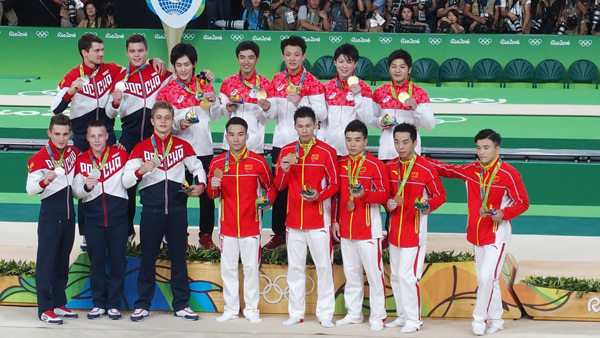Uchimura leads Japan to Olympic glory
RIO DE JANEIRO (BRA), AGU Office Aug 8, 2016: After silvers at the past two Olympic Games, Kohei Uchimura led the Japanese to the team gold medal in Men’s Gymnastics Monday night in Rio.
A seventh gold for Japan
The Japanese men extended their record as the most successful team in Men’s Gymnastics with their seventh Olympic team title, defeating Russia and 2008 and 2012 Olympic champions China in a suspense-filled final whose outcome was not decided until the final event.
The Japanese (Kohei Uchimura, Kenzo Shirai, Ryohei Kato, Yusuke Tanaka and Koji Yamamuro) began slowly on Pommel Horse and even trailed the Russians by two points after the second of six rotations. The reigning World champions didn’t begin pulling away until they went to Vault, where twisting sensation Shirai electrified the team by sticking one of his signature skills, a triple-twisting jump named in his honor. Japan never looked back, executing a string of sterling performances on Parallel Bars, Horizontal Bar and, under immense pressure, on Floor Exercise. There, Olympic and six-time World All-around champion Uchimura sealed the victory with a nearly flawless routine.
No team has been more successful in Olympic competition than the Japanese, who won five Olympic team titles between 1960 and 1976, as well as in Athens in 2004.
A personal victory for Uchimura
Team gold is the realisation of a long-held dream for Uchimura, the gymnast many consider the greatest of all time. For “King Kohei”, who owns team silvers from the Beijing and London Olympic Games, standing atop an Olympic podium with his teammates has been his number one goal, even over another All-around title.
Uchimura now has six Olympic medals, and having locked down the first gold in Men’s Gymnastics at this Games, he can focus on defending his title in Wednesday’s All-around final. He will have a third chance to add to his medal haul in the Floor final, an event where he won Olympic silver in 2012.
Sweet silver for Russia
The Russian men have waited 16 years to stand on an Olympic podium: their last team medal, a bronze, came in Sydney in 2000.
For a moment, it looked like Rio too might pass them by. Due to the doping scandal that put the entire Russian delegation’s Olympic participation in doubt, the team didn’t know if they would even be able to compete in Rio until last week.
If they were distracted, it didn’t show. Focused and precise throughout, the team (Ivan Stretovich, David Belyavskiy, Nikolai Kuksenkov, Denis Abliazin and Nikita Nagornyy) held the lead for two thirds of the evening but were unable to match the Japanese as they ascended on Parallel Bars, High Bar and Floor Exercise.
The end of Chinese domination
Bronze tastes bittersweet for the Chinese team (Deng Shudi, Lin Chaopan, Liu Yang, You Hao and Zhang Chenglong), for whom gold has been the standard at the Olympics since 2008. In a competition where no room is left for error, China began with a fall on Floor Exercise and recorded other small mistakes as the competition unfolded. Needing near perfect scores on High Bar to challenge for the gold on the last event, China couldn’t finish the job against either Japan or Russia.
After a third place finish at the last World Championships, this second bronze rings of the end of Chinese dominance in international competition.
Great Britain, USA odd teams out
Great Britain, who won Olympic bronze in 2012 and World silver in 2015, finished off the podium ahead of the United States at a competition where both teams had hoped for better. Host country Brazil, buoyed by the support of an adoring crowd, ranked sixth in their first ever Olympic team final. Germany and Ukraine, who bowed out of the competition early, rounded out the final in seventh and eighth.
FIG Media
